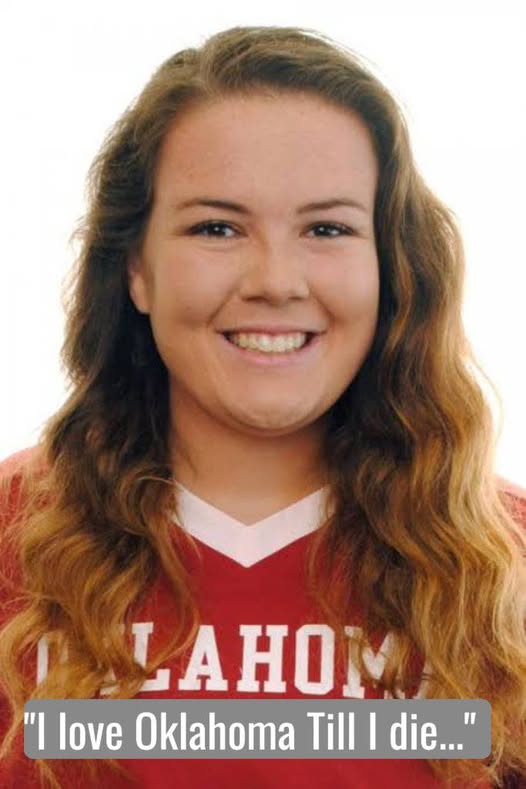There are moments in sport that transcend statistics and accolades, moments marked by profound significance, steeped in nostalgia, and resonating far beyond a field of play. For Paige Parker, one such moment is unfolding now. A prodigious talent who achieved national domination in Norman, she is journeying back to where it all began—back to the University of Oklahoma, back to the Sooners for a reunion no one could have scripted, a reunion that will echo for generations.
To understand the weight of Parker’s return, you must rewind to the spring of 2015. A freshman from Independence, Missouri, arrived on campus with poise defying her years. She was a four‑time All-American, a record-setting pitcher, and the recipient of the Big 12 Freshman of the Year award. From day one, she didn’t just fit in—she stood out. Her freshman campaign saw her post a 28–7 record, 217 innings pitched, 224 strikeouts, and a staunch 0.85 WHIP. She stamped herself as a cornerstone of the program .
By 2016, Parker’s stardom had entwined with Oklahoma’s rise to softball immortality. That year, she captured WCWS Most Outstanding Player honors, guiding the Sooners to their second national title. She returned in 2017 to deliver another championship. In 2018, her final collegiate season, she posted a jaw-dropping 31–3 mark with a microscopic 0.74 WHIP over nearly 188 innings pitched . In total, her Sooners tenure amassed 123 wins, 968 strikeouts, and four career perfect games—numbers that anchored her in the top ten both at Oklahoma and in NCAA Division I history .
Then came the professional chapter. Drafted sixth overall by the USSSA Pride in 2018, she continued her ascent as a premier pitcher, contributing to a Cowles Cup championship in the National Pro Fastpitch league . But what followed was equally impressive: Paige Parker donned the coach’s hat, guiding young pitchers to success. She started as an assistant at William Jewell College in 2019, moved on to a volunteer assistant role back at Oklahoma in 2020, and then honed her craft at Tulsa in 2020–2021, where her staff went 25–16 and included three sub-3.30 ERA pitchers .
All this culminated in 2021 when she joined the University of Utah staff as pitching coach, later being elevated in 2024 to associate head coach—a testament to her influence, with pitch staff improvements leading to a Pac‑12 Tournament Championship and Utah’s first WCWS appearance since 1994 . Parker’s trajectory was extraordinarily rich, from athlete to mentor, yet the pull toward Norman never entirely faded.
So, this is that rare, full-circle moment: a beacon returning home. The Sooners welcomed Parker back, and not as a player, nor as a volunteer, but as a key member of the coaching staff. To team and fans alike, this was no mere hire—it was a seismic move. Oklahoma Softball boasts eight national championships, including Gonzaga Gasso’s four‑peat from 2021–2024 . Even in this modern dynasty, Parker’s presence recalls the dominant eras, a living link to championship DNA.
Since her return, the impact has been immediate and unmistakable. Like it was the first pitch of opening day, the buzz engulfed Tom Osborne Hall and Love’s Field. Her mere presence—short, confident, moving with a quiet assertiveness—infused the pitching staff with renewed energy. Freshmen, sophomores, and upperclassmen alike gravitated toward an icon who walked their path not long before. She wasn’t just coach; she was mentor, teacher, example. Her stories carry authenticity. She showed them how to handle game-day nerves, how to shift mindset after a loss, how to build the mental stamina required at this level—nothing antiquated or theoretical, all drawn from first-hand experience on that ascendant Oklahoma four‑peat stage.
The Sooners noticed. Pitchers credited her with tightening their forms, tempering their internal fire, and navigating the season’s emotional toll. Even more, the intangible shifts mattered: confidence, camaraderie, belief. She led bullpen sessions, not by barking commands, but by setting tempos, adjusting grips mid-motion, quietly offering pointers based on situational nuance.
Fans felt it, too. Love’s Field buzzed each time Parker approached the mound. Reminders of her 2016–17 dominance echoed. Every knockout strike was greeted like a ghost of championships past, every change‑up executed with her signature mix of spin and control. Although head coach Patty Gasso stands as the cornerstone of the program, Parker’s name is now in every athlete’s vocabulary—her presence a bold reaffirmation of the program’s legacy.
For Oklahoma alumni and older fans, the emotional gravity is profound. They recall junior high and high school turns when Parker’s pitching duels became must-watch games. Now, they watch her again—on the same fields, with the same scarlet and cream, bearing the same fire, albeit in a coaching role. She never left the building; she walked new corners of it, built fresh relationships, but she always came back.
Her return is a strategic stroke, a thrill for recruits, a reaffirmation to returning Sooners, and a psychological advantage across the SEC and NCAA. There is storytelling charm in seeing a former star return, shoulders squared, ready to guide, to teach the basics of a lightning-fast rise through elite Division I play. And she emerged as a role model for young women seeking full-fledged ones: a four-time All-American, two-time national champion, and esteemed coach before 30.
This reunion courtyard ripples beyond Oklahoma—through the broader softball landscape. It signals to athletes: come here, work hard, and you just might come back to shape a legacy, not just live in it. For coaches: nurture relationship, seek alumni buy-in, and invest in culture. For softball lovers: savor the cyclical beauty—the next generation emboldened by those who came before.
Paige Parker returning is akin to prodigal devotion—a player-made legend reappearing as a guide, proof that sport isn’t just performance, it’s continuity. It whispers to recruits, “You may one day wear this jersey and coach here too.” It energizes fans with renewed hope that past glory can be re-engineered, that a program remains vibrant, tethered to its achievements.
Of course, expectations now rest heavy upon Parker’s shoulders. Oklahoma’s launch after her return featured early-season tests—SEC ranked opponents, high-pressure SEC tournament stakes, and late-season fatigue. But if history is any indicator, Parker thrives under such intensity. In 2016 she rose when stakes peaked, claiming WCWS Most Outstanding Player and outdueling elite pitchers under maddening pressure . She brings that blueprint today: embrace adversity, pivot swiftly, remind your pitchers that greatness waits on the other side of challenge.
Her role has grown more multifaceted. She now sits in staff strategy meetings, has a voice in recruiting efforts, and travels with team, instructing on-field mechanics in practice, influencing pitch sequencing, and mentoring catchers in framing and prep. She’s a beacon to recruit prospects from Missouri to California—”Come because she was here, she won here, now she guides here”—ties interior loyalties to a palpable lived ideal.
Soon, shifts seen in Utah may manifest here: Oklahoma’s ERA curve mirroring Utah’s plummet, freshmen emerging with confidence, veteran arms sharpening strikeout-to-walk ratios. Maybe a national title appears, maybe Parker’s fingerprints will lie in somebody else donning WCWS Most Outstanding Player, because she helped carve them. The storyline writes itself—great player, great coach, stitches of past sewn into present and future.
Paige Parker’s homecoming casts a starkly human narrative across the statistics. She once lived on $5 pizza and early morning workouts in Norman; now she lives coaching in that same space. The rooms remained, but she’s not alone: she filled them with new faces, new stories. Yet, they echo the rhythms she once made—expectant glances when the ball climbs the rubber, collective breaths at pitch delivery, jubilation when a strikeout ends inning. Those rhythms have a familiar cadence; Oklahoma listens intimately.
This is a program rewriting itself around its past, not trapped by it. Parker’s re-entry tells us something: the Sooner way transcends individual players—it is a lineage bridged by coaching tenures, alum influence, shared victory gardens. Parker’s legacy now bifurcates into player and coach. Soon the imprint may become deeper than any four‑year career. When years from now fans talk about the 2040 squad, they might still recognize Paige Parker’s influence, embedded in fundamentals, culture, focus.
And so she is back—where it all began. The walk from where she launched her legend to where she now plots future triumphs is momentous. She stepped on campus at 19, arms shaking, dreams alight. She steps again at 29, arms steady, vision wide. The arc stretches—five national championships, a pro title, coaching tenure blossoming, a staff promotion. But the locus remains Norman.
In the game of life, Paige Parker came home. In doing so, she gifted Oklahoma softball a powerful story. It is a story of return, of giving back, of generational echoes, of dreams fulfilled and ambitions reborn. On these fields, amid crimson banners, under bright stadium lights, her return will be felt every time a high school pitcher zips a 65‑mph change‑up into the mitt—“I want to be here someday,” they’ll think—“just like her.”
That is legacy, evolving. That is home, revisited. That is Paige Parker’s bombshell move: not merely a coaching hire, but a moment suspended in time—celebrated, honored, full of promise. She’s back where it all began, and now she’s helping them begin again.



